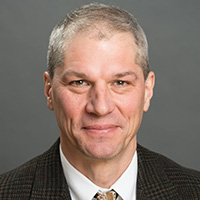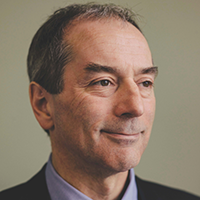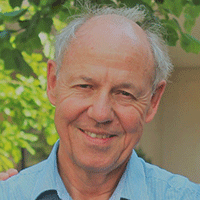
John Bischof, University of Minnesota
Keynote Title: Nanowarming for Regenerative Medicine
Abstract: This talk will introduce a new Gen-4 NSF Engineering Research Center entitled Advanced Technologies for the Preservation of Biological Systems (ATP-Bio). This ERC focuses on cryopreservation of living biological systems to improve human and eco-system health. The talk will also introduce several new technologies which focus on rapid rewarming technologies to improve cryopreservation. In one important example, gold and iron oxide nanoparticles are used to transduce optical or radiofrequency electromagnetic fields to affect heating of biomaterials at multiple scales (1 µL droplets to L systems). This application of “nanowarming” allows both rapid and uniform rewarming of vitrified (i.e., cryopreserved) biomaterials back from the cryogenic state, thereby avoiding crystallization and cracking failures. This and other new techniques allow rewarming at predictable and controllable rates from 10’s to 10,000,000’s of °C/min, thereby addressing a key technology bottleneck for larger (e.g., tissues and organs) and smaller vitrified systems (e.g., embryos and oocytes). These new rates now allow improved cell, tissue, and organ cryopreservation, including the first robust drosophila and zebrafish embryo cryopreservation methods yielding live and reproducing young. In summary, this talk demonstrates the growing opportunities for cryopreservation in regenerative medicine and biodiversity.
Biography: Bischof works in the area of thermal bioengineering with a focus on biopreservation, thermal therapy, and nanomedicine. His awards include the ASME Van Mow Medal and Fellowships in societies including Cryobiology, JSPS, ASME, IAMBE and AIMBE. He has served as the President of the Society for Cryobiology and Chair of the Bioengineering Division of the ASME. Bischof obtained a B.S. in Bioengineering from U.C. Berkeley (UCB) in 1987, an M.S. from UCB and U.C. San Francisco in 1989, and a Ph.D. in Mechanical Engineering from UCB in 1992. After a Post-doctoral Fellowship at Harvard in the Center for Engineering in Medicine, he joined the faculty of the University of Minnesota in 1993. Bischof is now a Distinguished McKnight University Professor and Kuhrmeyer Chair in the Departments of Mechanical and Biomedical Engineering, the Medtronic-Bakken Endowed Chair and Director of the Institute for Engineering in Medicine at the University of Minnesota, and Director of the new NSF Engineering Research Center ATP-Bio.

D. Q. Kern Award Lecture by:
Dr. John H. Lienhard V, MIT
Lecture Title: Thermal Systems Engineering for Desalination and Ion Separations
Abstract: The world's renewable fresh water supply, from net precipitation, has become much more variable as our climate changes. Further, world population has risen steeply in the last century, and the water demands of growing economies continue to rise. As a result, water scarcity is an growing worldwide problem, with water shortages impacting both human populations and ecosystems.
Desalination has been deployed worldwide to expand the supply of freshwater, especially for coastal populations, and its use has increased rapidly, with more than 100 billion L/day of capacity now installed. The cost and lifetime of plants has also improved steadily. Nonetheless, desalination processes need greater sustainability and circularity, including energy efficiency and resource recovery. In this talk, I will discuss our research on energy inefficiency in desalination, selective recovery of chemical and mineral resources from saline water, and the application of concepts from thermal systems engineering to improve the performance of both thermal and membrane desalination systems. Examples will be drawn from reverse osmosis, humidification-dehumidification, membrane distillation, solvent extraction, lithium capture, and brine valorization.
strong>Biography: John H. Lienhard V is the Abdul Latif Jameel Professor and the founding Director of the Abdul Latif Jameel Water and Food Systems Lab at MIT (J-WAFS). During more than three decades on the MIT faculty, Lienhard's research and educational efforts have focused on heat and mass transfer, water purification and desalination, and thermodynamics. He has also filled a number of administrative roles at MIT.
Lienhard's research on water purification has spanned a wide range of technologies for desalination and waste brine management, with a focus on energy efficiency and environmental protection. Lienhard has directly supervised 100 graduate theses and postdoctoral associates and is author of more than 300 peer-reviewed publications. He has been issued 38 US patents, most of which have been commercialized through start-up companies.
Lienhard is a Fellow of the American Society of Mechanical Engineers (ASME), a Fellow of the American Association for the Advancement of Science (AAAS), and a Fellow of the American Society of Thermal and Fluid Engineers (ASTFE). He is a recipient of the 1988 National Science Foundation Presidential Young Investigator Award, the 1992 SAE Teetor Award, a 1997 R&D 100 Award, the 2012 ASME Technical Communities Globalization Medal, the 2015 ASME Heat Transfer Memorial Award, the 2019 ASME Edward F. Obert Award, and the 2021 AIChE Donald Q. Kern Award.

Max Jakob Memorial Award Lecture by:
Dr. Michael Modest
Lecture Title: Radiative Heat Transfer in Combustion Systems
Abstract: In many important combustion applications, heat transfer is dominated by thermal radiation from combustion gases and soot. Thermal radiation from combustion gases is extremely complicated, and accurate and efficient predictions are only now becoming possible with the use of accurate global methods, such as full-spectrum k-distributions, and with state-of-the-art line-by-line accurate Monte Carlo methods. The coupling between turbulence and radiation can more than double the radiative loss from a flame. Radiative properties and computational methods will be briefly discussed, and several examples of turbulent reacting flows, an oxy-fuel furnace, high pressure laminar flames and high-pressure fuel spray in combustion engines will be presented. Thermal radiation can also be used as an optical diagnostic tool to determine temperature and concentration distributions, which will be briefly discussed.
Biography: Dr. Modest received his Dipl.-Ing. degree from the Technical University in Munich (1968), and in 1972 obtained his M.S. and Ph.D. in Mechanical Engineering from the University of California at Berkeley. For several years he taught at Rensselaer Polytechnic Institute and the University of Southern California, followed by 24 years a Professor of Mechanical Engineering at the Pennsylvania State University, from which he retired in 2009 with the title of Distinguished Professor Emeritus. He then served as Shaffer and George Professor of Engineering at the University of California, Merced, from which he retired in 2018 as Distinguished Professor Emeritus.
During his career Dr. Modest has made many seminal contributions in all areas of radiative heat transfer, as well as in the field of laser processing of materials. He is perhaps best known for his work on thermal radiation in combustion systems, and is the author of “Radiative Heat Transfer” (presently in its 4th ed). He has over 370 refereed publications, including 2 books, 10 book chapters. He is an ASME Honorary Member and was recipient of many national and international honors, including the ASME Heat Transfer Memorial Award, the AIAA Thermophysics Award, and the Humboldt Research Award.